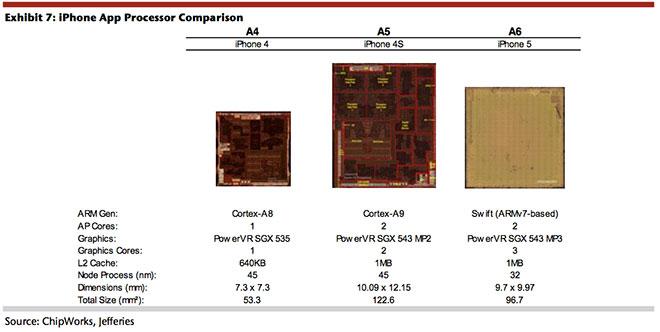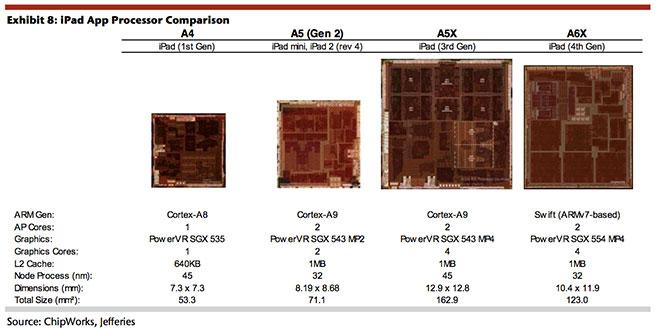Rumor: Apple may re-architect iOS to utilize more processor cores ahead of iPhone 6
Last updated
Feeling the heat from Samsung in the smartphone market, Apple is constantly exploring ways to improve its edge on the South Korean electronics giant, including a possible rewrite of its iOS platform in order to leverage SoCs with as many as eight processing cores ahead of next year's launch of the iPhone 6.
Editor's Note: It has been brought to our attention that certain specific claims of the Jefferies report are somewhat suspect, specifically regarding a March media event. AppleInsider has reached out to analyst Peter Misek, who maintains a high level of confidence regarding his hardware predictions. As with any research-based report, the information within should be taken with a grain of salt.
The report comes by way of Jeffries analyst Peter Misek, who on Wednesday released an abundance of forward-looking information on Apple's product roadmap, supposedly acquired through his traditional channel checks and supply chain sources.
While discussing a number of perceived bottlenecks that are reportedly preventing Apple from accelerating the launch of a 4.8-inch "iPhone 6" into the 2013 calendar year, Misek mentioned display yield issues, challenges in advancing to a 20-nanomemter manufacturing process for its next A-series mobile processor, and a desire to re-engineer its mobile operating system handle A-series processors with as many as 8 processing cores.
We think Apple plans to re-architect iOS to utilize more cores and better compete with Samsung. Also, we believe the way iOS interoperates with iCloud, gestures controls, and advertising will be substantially upgraded.
While Apple and Samsung have emerged as fierce competitors in the mobile computing space in the last 24 months, their modern day relationship was actually forged in a partnership back in 2005.
At the time, Apple was seeking a stable supplier of massive quantities of flash memory and found that in Samsung. The relationship eventually grew to include Samsung manufacturing for Apple the A-series SoCs (or embedded mobile processors) found at the heart of each iPhone and iPad.
With the two companies now locked in a struggle for supremacy in the global smartphone market, Apple has been moving to reduce its dependence on Samsung, thereby better protecting its intellectual property and future product plans.
To that end, Apple is expected to switch production of its A-series process to TSMC. According to Misek, the unknown element is "when Samsung and Apple's foundry relationship ends and what the end of the agreement means."
"Some think it ends on December 31, 2013, and that Samsung could be completely removed as a supplier," Misek said. "While the 'completely' part appears to be an exaggeration, we think that Apple could see pricing increases on whatever app processors it does not move over to TSMC."
The analyst estimates Apple will need roughly 300 million A-series processors in 2014, making a complete transition away from Samsung unlikely. His sources indicate that Samsung has been working off gross margins of around 30 percent when manufacturing the chips for Apple, but TSMC appears unwilling to accept margins short of 40 percent.
The wildcard is if Intel decides to fab for Apple; however, Intel fears that if Apple uses Intel’s advanced processing nodes that it will accelerate Apple’s replacement of X86 PCs with ARM-based PCs. But ultimately Intel’s utilization rates could make this attractive to Intel at some point.
In the meantime, Misek doesn't expect much of a change to the A-series processor that will ship in the so-called iPhone 5S due later this year. It will be similar to the dual-core. 32-nanometer design currently shipping under the A6 name inside each iPhone 5. Come 2014, though, his sources are indicating that Apple plans to include a version of the chip in the iPhone 6 with between four and eight cores.
 AppleInsider Staff
AppleInsider Staff















 Amber Neely
Amber Neely
 Thomas Sibilly
Thomas Sibilly

 William Gallagher
William Gallagher
 Malcolm Owen
Malcolm Owen
 Christine McKee
Christine McKee










56 Comments
Doesn't anyone even proof the titles of these post? (Original title "Apple may to re-architect iOS to utilize more processor cores ahead of iPhone 6")
Of course Apple will update iOS to take advantage of more cores when more cores makes it a better overall experience but to say "We think Apple plans to re-architect iOS to utilize more cores and better compete with Samsung" is pretty absurd considering where Apple currently stands with iOS and their ASICs and how poor the quad-core ARM chips have served smartphones up to this point.
May rearchitect? Hell, they've rearchitected years prior and when the hardware arrives the OS will be ready. You don't change course at the last minute. These designs are 18-36 months in planning.
Where is the evidence that iOS doesn't *already* support multiple core CPUs? It would seem to be an egregious mistake if true. I find it hard to believe the premise.
Wait! What?! I thought Apple already did that with GCD! Years ago with both iOS and OS X. It doesn't matter how many cores the device/computer has the OS (iOS and OS X) will utilize them efficiently as needed.